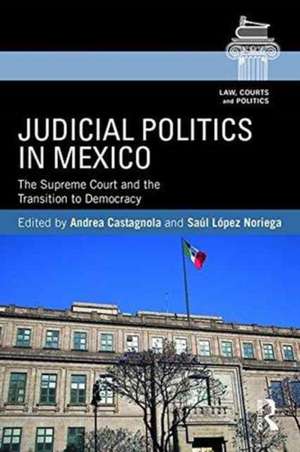Judicial Politics in Mexico: The Supreme Court and the Transition to Democracy: Law, Courts and Politics
Editat de Andrea Castagnola, Saul Lopez Noriegaen Limba Engleză Paperback – 27 oct 2016
It has become essential in studying the new role of the Supreme Court to obtain a more accurate and detailed diagnosis of the performances of its justices in this new political environment. Through critical review of relevant debates and using original data sets to empirically analyze the way justices voted on the three main means of constitutional control from 2000 through 2011, leading legal scholars provide a thoughtful and much needed new interpretation of the role the judiciary plays in a country’s transition to democracy
This book is designed for graduate courses in law and courts, judicial politics, comparative judicial politics, Latin American institutions, and transitions to democracy. This book will equip scholars and students with the knowledge required to understand the importance of the independence of the judiciary in the transition to democracy.
| Toate formatele și edițiile | Preț | Express |
|---|---|---|
| Paperback (1) | 407.57 lei 6-8 săpt. | |
| Taylor & Francis – 27 oct 2016 | 407.57 lei 6-8 săpt. | |
| Hardback (1) | 1107.61 lei 6-8 săpt. | |
| Taylor & Francis – 8 dec 2016 | 1107.61 lei 6-8 săpt. |
Preț: 407.57 lei
Nou
Puncte Express: 611
Preț estimativ în valută:
77.100€ • 81.13$ • 64.39£
77.100€ • 81.13$ • 64.39£
Carte tipărită la comandă
Livrare economică 14-28 aprilie
Preluare comenzi: 021 569.72.76
Specificații
ISBN-13: 9781138697829
ISBN-10: 1138697826
Pagini: 190
Ilustrații: 36
Dimensiuni: 152 x 229 x 14 mm
Greutate: 0.25 kg
Ediția:1
Editura: Taylor & Francis
Colecția Routledge
Seria Law, Courts and Politics
Locul publicării:Oxford, United Kingdom
ISBN-10: 1138697826
Pagini: 190
Ilustrații: 36
Dimensiuni: 152 x 229 x 14 mm
Greutate: 0.25 kg
Ediția:1
Editura: Taylor & Francis
Colecția Routledge
Seria Law, Courts and Politics
Locul publicării:Oxford, United Kingdom
Public țintă
Postgraduate and UndergraduateCuprins
Introduction
Tom Ginsburg
Chapter 1: The Transformations of the Role of the Mexican Supreme Court
Andrea Pozas-Loyo and Julio Ríos-Figueroa
Chapter 2: The Law as Power: Strategic Litigation in Mexico
Pedro Salazar Ugarte
Chapter 3: Are Mexican Justices true arbiters among political elites? An empirical analysis of the Court´s rulings from 2000-2011
Andrea Castagnola and Saúl López Noriega
Chapter 4: The Supreme Court and the (no) Rights Revolution. An Empirical Analysis of the Court´s Rulings 2000-2011
Andrea Castagnola and Saúl López Noriega
Chapter 5: Constitutional Change and the Supreme Court Institutional Architecture: Decisional Indeterminacy as an Obstacle to Legitimacy
Francisca Pou Giménez
Conclusion
Matthew C. Ingram
Tom Ginsburg
Chapter 1: The Transformations of the Role of the Mexican Supreme Court
Andrea Pozas-Loyo and Julio Ríos-Figueroa
Chapter 2: The Law as Power: Strategic Litigation in Mexico
Pedro Salazar Ugarte
Chapter 3: Are Mexican Justices true arbiters among political elites? An empirical analysis of the Court´s rulings from 2000-2011
Andrea Castagnola and Saúl López Noriega
Chapter 4: The Supreme Court and the (no) Rights Revolution. An Empirical Analysis of the Court´s Rulings 2000-2011
Andrea Castagnola and Saúl López Noriega
Chapter 5: Constitutional Change and the Supreme Court Institutional Architecture: Decisional Indeterminacy as an Obstacle to Legitimacy
Francisca Pou Giménez
Conclusion
Matthew C. Ingram
Notă biografică
Andrea Castagnola is a Post-Doctoral Fellow in the Comparative Politics Department at the University of Bergen and is Assistant Professor at FLACSO-Mexico. Her research focuses on judicial politics in Latin America and comparative politics.
Saúl López Noriega is Associate Professor at the Centro de Investigación y Docencia Económica (CIDE). He teaches courses on constitutional law and democracy, power, and media. His research focuses on issues of constitutional justice, democracy and constitutional courts, and media concentration.
Saúl López Noriega is Associate Professor at the Centro de Investigación y Docencia Económica (CIDE). He teaches courses on constitutional law and democracy, power, and media. His research focuses on issues of constitutional justice, democracy and constitutional courts, and media concentration.
Recenzii
"This book extends the boundaries of our understanding of the evolving role of the Court in the political evolution in Mexico from 1917 to the more recent process of democratization in this country. Throughout all of the authors’ contributions, this work is a fine-grained analysis that permits us to understand the institutional changes in the Supreme Court and in its relations to other socio-political actors. Employing a wide collection of methodologies and theoretical approaches, the authors contribute in a remarkable way to elucidate not only the Mexican case but also the role of the courts in the dynamics of democratization from a comparative perspective. Indeed, this book is an exciting new contribution for scholars of Mexico and for other interested in the field of comparative judicial politics. To be sure, this edited book will be a useful toolkit for lawyers and political scientists, and for professors and students."
Rodolfo Sarsfield, Universidad Autónoma de Querétaro
"What role does the Mexican Supreme Court play in democratization? This collection answers this question by examine mechanisms by which the court has become empowered and activated throughout the consolidation phrase as well as the court’s decision-making logic and impact on Mexican democracy. It combines qualitative and quantitative analysis, novel data collections, and a host of perspectives into fresh insights on this emblematic case. The result is a compelling analysis that makes a theoretical contribution with practical implications for institutional design."
Ryan Carlin, Georgia State University
"… opens important avenues for future comparative research."
Latin American Research Review
Rodolfo Sarsfield, Universidad Autónoma de Querétaro
"What role does the Mexican Supreme Court play in democratization? This collection answers this question by examine mechanisms by which the court has become empowered and activated throughout the consolidation phrase as well as the court’s decision-making logic and impact on Mexican democracy. It combines qualitative and quantitative analysis, novel data collections, and a host of perspectives into fresh insights on this emblematic case. The result is a compelling analysis that makes a theoretical contribution with practical implications for institutional design."
Ryan Carlin, Georgia State University
"… opens important avenues for future comparative research."
Latin American Research Review
Descriere
Analyzes the role the Supreme Court had in the highly anticipated democratization process and on the quality of democracy in Mexico.


























